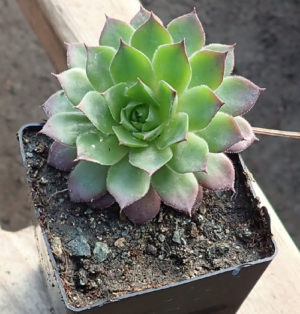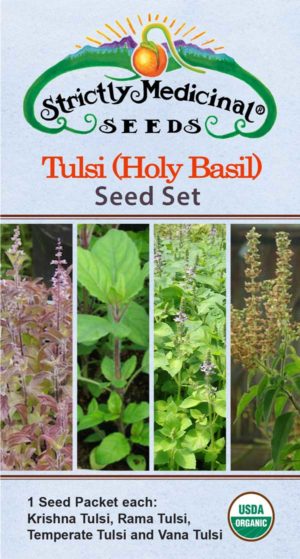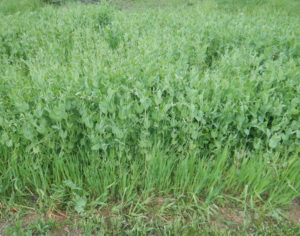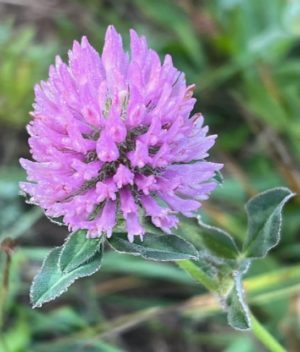Empress Tree (Paulownia tomentosa) seeds, organic [TN, AL, NC, CT no]
Price range: $3.95 through $34.10
Family: Figwort (Scrophulariaceae)
Hardy to Zones 6 to 12.
Deciduous tree native to central and western China. This is one of the most impressively large-leaved (elephant ear size) plants that you can grow. The plant commonly increases 15 feet in height in a single year. I let some of them go to full size (to collect the flowers and the seed) and I keep one near the greenhouse cut back so it bushes out hugely each year and provides shade for the potted plants and the transplanters in the summer months. The tree figures strongly in lore and legend, and the poles are useful around the farm for trellising. The fast growth and the great surface area of the leaves makes this one of the most significant “carbon sinks” available on the planet. Removes carbon dioxide from our atmosphere and replaces this gas with breathable oxygen at approximately twice the rate of a “normal” tree. Traditional usage: manufacture of medicinal grade charcoal. Prefers full sun to part shade and a moist soil (roots run close to the surface). Sow seeds just subsurface in fast draining soil. Keep warm and moist until germination. Work up in pots. Important to note that the tree is herbaceous (ie dies back to the ground in the fall) for the first few years of its life, then becomes woody. Space trees at least 20 feet apart.
Packet contains 200 seeds
1 g contains ~1,800 seeds
5 g contains ~9,000 seeds
10 g contains ~18,000 seeds
Certified Organically Grown [not available to TN, AL, NC or CT]

![Empress Tree (Paulownia tomentosa) seeds, organic [TN, AL, NC, CT no]](https://strictlymedicinalseeds.com/wp-content/uploads/2017/08/Paulownia-tomentosa-2.jpg)
![Empress Tree (Paulownia tomentosa) seeds, organic [TN, AL, NC, CT no] - Image 2](https://strictlymedicinalseeds.com/wp-content/uploads/2016/11/Empress_tree_2018_500.jpg)
![Empress Tree (Paulownia tomentosa) seeds, organic [TN, AL, NC, CT no] - Image 3](https://strictlymedicinalseeds.com/wp-content/uploads/2017/08/Empress_tree_flower_300.webp)
![Empress Tree (Paulownia tomentosa) seeds, organic [TN, AL, NC, CT no] - Image 4](https://strictlymedicinalseeds.com/wp-content/uploads/2016/11/Empress_tree_potted_tree.webp)
![Empress Tree (Paulownia tomentosa) seeds, organic [TN, AL, NC, CT no] - Image 5](https://strictlymedicinalseeds.com/wp-content/uploads/2017/08/empress-tree.jpg)




Question
Geraldo Silva –
The Certified Organically Grown is valid in Europe?
Upvote if this was helpful (0) Downvote if this was not helpful (0) Watch Unwatch Flag for removal
Richo Cech –
Hi Geraldo,
Yes, it is most certainly valid in Europe. You can access the certification right on our homepage.
Richo
Upvote if this was helpful (0) Downvote if this was not helpful (0) Flag for removal
Antonio –
is this plant drought tolerant?
Upvote if this was helpful (0) Downvote if this was not helpful (0) Flag for removal
Richo Cech –
Hello Antonio, My observation is that they do best in mesic soils. Like many plants they need more moisture to get started and then less once they get their roots down. At that point, yes, they are drought tolerant. r
Upvote if this was helpful (0) Downvote if this was not helpful (0) Flag for removal
Antonio –
how close can you plant these?
Upvote if this was helpful (0) Downvote if this was not helpful (0) Flag for removal
Richo Cech –
This really depends on the end use. As a large tree in the landscape they are best planted singly, as they are enormously spreading. For pole production you can plant them 15 feet apart and coppice. r
Upvote if this was helpful (0) Downvote if this was not helpful (0) Flag for removal
Question
serenityscornergallery55 –
How many seeds do you plant in each 20′ space? Thank you.
Upvote if this was helpful (0) Downvote if this was not helpful (0) Watch Unwatch Flag for removal
Richo Cech –
Hi there! Empress tree seeds respond best to standard horticultural practice–a deep flat of rich potting soil in a warm and sunny exposure. Barely cover, tamp and keep evenly moist until germinated. Work up in successively larger pots. I don’t think it works well to direct-seed them in a 20′ bed, but if you want to try, then make a shallow furrow and sprinkle the seeds in and cover. A gram of seed would probably go 10′ or so. Thin and cultivate. r
Upvote if this was helpful (0) Downvote if this was not helpful (0) Flag for removal